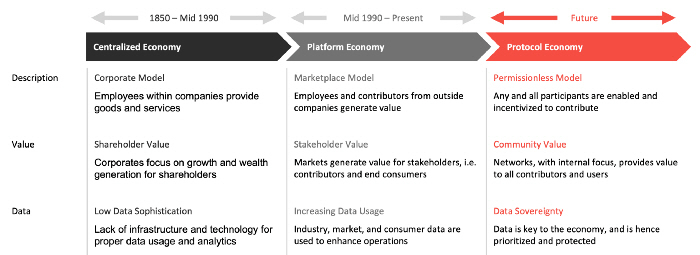Just as people are getting used to the concept of cryptocurrencies, new terms like “DeFi,” nonfungible token and metaverse have become the talk of the town.
While an increasing use of NFTs opens up a wide range of virtual services in the metaverse, investors are seeing huge business opportunities from these technologies that could reshape the digital world. And some are moving quickly to back novice blockchain startups with fresh ideas and potential.
The Korea Herald met Ethan Kim, partner and co-founder of Hashed, a South Korean investment firm focusing on blockchain, to provide better understanding of the new industry and to share his insights.
Hashed, launched in 2017, has been leading the market interests in the latest technology. It raised $120 million for its first crypto fund in December last year to support blockchain projects.
In the interview, Kim said the decentralized technology will become the core of the global economy, and with that belief the company has been looking for promising global and domestic blockchain projects. Currently, Kim is in charge in the company’s startup accelerator programs. Before Hashed he was an engineer and founder of mobile game maker Baglecode.
Following is a question-and-answer session with Kim.
 |
Hashed Co-founder and Partner Ethan Kim (Hashed) |
Q: Do you think people should aggressively take advantage of blockchain, the metaverse or cryptocurrency technologies?
A: Getting to know the blockchain technology is not a must, but it doesn’t hurt to learn about it. Luckily, the current generation of those in their 40s and 50s are more open to accepting new technologies. One thing is for sure: A new life can be created in a virtual world and the boundaries are breaking down.
Q: How can those technologies benefit people?
A: I believe the benefits of this technology will parallel those of the internet. Information technology has contributed and will continue to improve access to better quality of life. DeFi (decentralized finance) and NFTs will eliminate the constraints of the digital world.
Q: Where are we with blockchain technology in regard to its application in everyday life?
A: It is in its infancy, but the technology is still proving it’s worth to consumers. However, there should be more cases applicable for real life. With the metaverse and NFTs converging, it can create a market that is way bigger than now.
Q: How about the current trends of blockchain companies in South Korea?
A: What I have observed in the last four years is that blockchain projects tend to be global from the get-go. So the projects we invest in are not limited to Korea. And there are many projects related to DeFi and NFTs. You see an increasing number of digital art collectors for NFTs and I think it’s a period when the public is getting used to the concept. We can imagine so many possibilities such as displaying NFTs in a gallery in the digital world, which yields a whole new experience.
Q. Hashed went through the crypto market bubble burst in 2018. What happened?
A: Many Korean developers gave up their projects in 2018 when the domestic markets were rife with uncertainty because of the looming threat of stricter regulations. Those few who had faith in blockchain turned to overseas markets. It’s regrettable that many meaningful projects were discontinued, leading to a more user-dominated Korean blockchain market
Q: What’s your take on the recent cryptocurrency frenzy?
A: Crypto investments are individual decisions and they have the freedom to invest as we please. But there needs to be a sound system in place that ensures reliability such as a stringent ICO screening process.
 |
Hashed logo (Hashed) |
Q. What criteria does Hashed have for companies in terms of investment? And what are your investment focuses for 2021?
A: Last year, we invested in NFT games, marketplaces and platforms. In 2021, we’re focusing on projects related to DeFi and nonfungible tokens.
We are focusing on how apps that are built on blockchain will change human behavior and create value.
For instance, protocol economy can transform the current centralized economy system. Protocol economy refers to an economic system where individuals or groups can participate in the economic activities and earn rewards according to their contributions. One example is the Juventus Football Club’s Fan Token, a utility token that gives Juventus fans a tokenized share of influence on club decisions.
 |
A protocol Economy in comparision with a platform economy and a centralized economy (Hashed) |
Q. As a former engineer, why did you decide to become an investor?
A: There are so many new possibilities to explore in the industry. Some of them are very meaningful in terms of business. At the same time, it gives me the opportunity to meet brilliant founders from whom I can learn and share my experiences as a company founder as well. Having been an engineer does not make you a better investor, but it does allow you to have a unique perspective and better understanding of IT technologies.
Q. What roles does Hashed want to play in the blockchain ecosystem?
Our goal is to accelerate the mass adoption of blockchain by investing our own resources and empowering a new wave of entrepreneurs and innovators. Also, Hashed can become a bridge between US and Asian ecosystems. Overseas investors and founders are very much interested in the regulatory environment in South Korea as well as users’ interest.
Q. What would you suggest children learn for the future you foresee?
A: I think the ability to adapt to the rapid evolutions of the digital world is something the younger generation should be taught. An emphasis on programming would be best. When certain jobs eventually become obsolete, I think many will create content and sell that content to make ends meet. So creative thinking and making those thoughts into unique content will be an important ability in the future.
Step 1 to understanding the world of blockchain
Metaverse: The metaverse is a term used to describe the virtual world shared by internet users, particularly through virtual reality and augmented reality.
DeFi: Decentralized finance refers to a blockchain-based form of finance that does not rely on central financial intermediaries such as brokerages, exchanges or banks but instead uses smart contracts.
NFTs: Nonfungible tokens are digital counterparts of real-world assets such as art pieces and music. They often take the form of memes, iconic videos, digital art and in-game items.
Protocol Economy: A protocol economy is an economic system where individuals or groups earn rewards according to their contributions and is similar to a Bitcoin mining network. The term was coined by Kim Seojoon, the cofounder and CEO of Hashed. |




![[Herald Interview] 'Korea, don't repeat Hong Kong's mistakes on foreign caregivers'](http://res.heraldm.com/phpwas/restmb_idxmake.php?idx=644&simg=/content/image/2024/11/13/20241113050481_0.jpg)

![[KH Explains] Why Yoon golfing is so controversial](http://res.heraldm.com/phpwas/restmb_idxmake.php?idx=644&simg=/content/image/2024/11/13/20241113050608_0.jpg)



